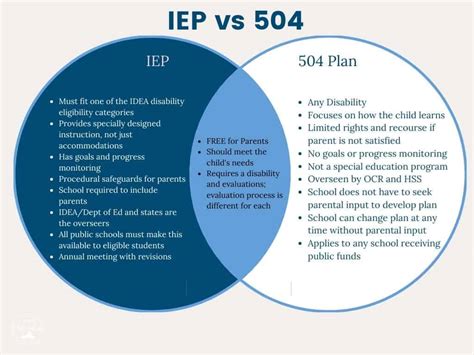Yes, you can have both a 504 plan and an Individualized Education Program (IEP) if you qualify for both. A 504 plan is a legal document that outlines the accommodations and supports that a student with a disability needs in order to access their education. An IEP is a similar document that is developed for students with disabilities who need more intensive support than what can be provided through a 504 plan.

What is the Difference Between a 504 Plan and an IEP?
The main difference between a 504 plan and an IEP is the level of support that is provided. A 504 plan typically provides accommodations and supports that are designed to help a student with a disability access their education in the general education classroom. An IEP, on the other hand, provides more intensive support and services that are designed to help a student with a disability make progress towards their educational goals.
Another difference between a 504 plan and an IEP is the eligibility criteria. A student is eligible for a 504 plan if they have a disability that substantially limits one or more major life activities. A student is eligible for an IEP if they have a disability that affects their educational performance.
How to Get a 504 Plan or an IEP
To get a 504 plan, you must first provide documentation of your disability to your school district. The school district will then evaluate your child to determine if they are eligible for a 504 plan. If your child is eligible, the school district will develop a 504 plan that outlines the accommodations and supports that your child needs.
To get an IEP, you must first request an evaluation from your school district. The school district will then evaluate your child to determine if they are eligible for an IEP. If your child is eligible, the school district will develop an IEP that outlines the goals, services, and supports that your child needs.
Benefits of Having a 504 Plan or an IEP
There are many benefits to having a 504 plan or an IEP. These benefits include:
- Improved access to education
- Increased academic achievement
- Reduced behavioral problems
- Improved social skills
- Increased self-esteem
Conclusion
If you have a disability, you may be eligible for a 504 plan or an IEP. These plans can provide you with the accommodations and supports that you need to succeed in school. To learn more about 504 plans and IEPs, talk to your school district.
Frequently Asked Questions
- What is the difference between a 504 plan and an IEP?
- How do I get a 504 plan or an IEP?
- What are the benefits of having a 504 plan or an IEP?
A 504 plan provides accommodations and supports that are designed to help a student with a disability access their education in the general education classroom. An IEP provides more intensive support and services that are designed to help a student with a disability make progress towards their educational goals.
To get a 504 plan, you must first provide documentation of your disability to your school district. The school district will then evaluate your child to determine if they are eligible for a 504 plan. If your child is eligible, the school district will develop a 504 plan that outlines the accommodations and supports that your child needs.
To get an IEP, you must first request an evaluation from your school district. The school district will then evaluate your child to determine if they are eligible for an IEP. If your child is eligible, the school district will develop an IEP that outlines the goals, services, and supports that your child needs.
There are many benefits to having a 504 plan or an IEP. These benefits include:
- Improved access to education
- Increased academic achievement
- Reduced behavioral problems
- Improved social skills
- Increased self-esteem
Additional Information
- IEP vs. 504: What’s the Difference? | Understood
- 504 Plan vs. IEP: Two Ways to Get Help at School | Wrightslaw
- 504 and IEP: What’s the Difference? | LD OnLine
